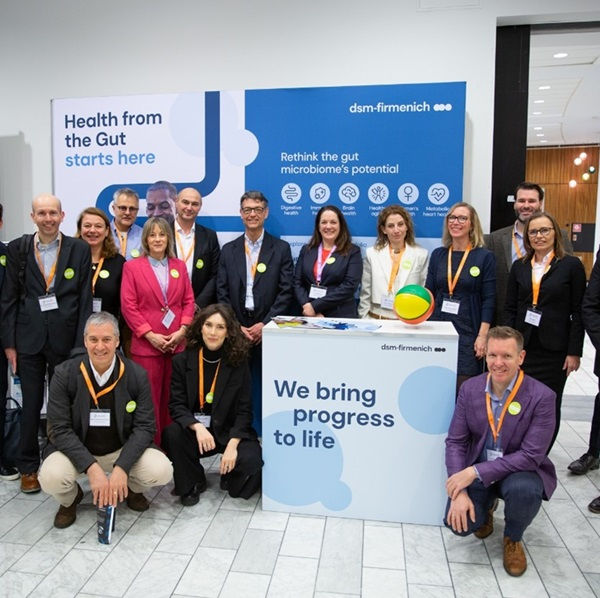
News
April 2, 2025
The gut microbiome as a pathway to supporting children with autism: New study reveals synbiotics' dual benefits for digestive and behavioral symptoms
Discover new clinical evidence highlighting the potential of synbiotic supplementation in autism spectrum disorder (ASD).

Summary
- Emerging research continues to strengthen our understanding of the microbiome-gut-brain axis, revealing how digestive health may influence neurological function, behavior, and overall well-being—particularly relevant for conditions like autism spectrum disorder (ASD).
- Gastrointestinal symptoms affect a significant portion of children with autism,1 creating a potential opportunity for targeted nutritional solutions that address both physical discomfort and associated behavioral challenges via modulation of the gut microbiota.
- New clinical evidence from dsm-firmenich demonstrates that synbiotic supplementation—with or without gut-directed hypnotherapy—significantly improves gastrointestinal symptoms in children with ASD while offering additional benefits for behavior and anxiety, supporting a more holistic approach to care.1
A groundbreaking study led by researchers at dsm-firmenich and published in the Journal of Autism and Developmental Disorders has investigated the potential of pairing synbiotic supplements with innovative therapeutic approaches for addressing physical and behavioral symptoms in children with autism spectrum disorder (ASD) and disorders of gut-brain interaction.[1] The 12-week intervention examined the effects of a specialized synbiotic formula (combining selected probiotic strains with prebiotic fiber) both alone and in combination with gut-directed hypnotherapy, a therapeutic method that uses relaxation techniques to help manage gut-related disorders.
The results revealed significant improvements in gastrointestinal comfort plus benefits in reducing anxiety and irritability when the interventions were combined—revealing promising new approaches for supporting children with autism and disorders of gut-brain interaction. To understand the impact of this research, we sat down with Dr. Robert E. Steinert, HNC Principal Scientist at dsm-firmenich and co-author of this groundbreaking study. Here’s what he had to say.

1. What prompted this research into gut health approaches for autism?
“First, the dramatic rise in autism diagnoses globally. The World Health Organization (WHO) reports approximately 1 in 100 children worldwide are affected, and in the US alone, prevalence jumped from 1 in 150 children in 2000 to 1 in 54 by 2020.2
“Additionally, clinical evidence consistently shows that children with ASD frequently experience disorders of gut-brain interaction and significant gastrointestinal distress, such as constipation, diarrhea, bloating, and abdominal pain.3,4,5 These digestive issues aren't merely uncomfortable—they often correlate with increased behavioral challenges and anxiety too,2 creating additional burdens for children and caregivers alike.”
2. Can you explain the connection between gut health and autism?
“The microbiome-gut-brain axis represents a fascinating bidirectional communication network linking intestinal function with the central nervous system. In recent years, research has revealed that this connection may be particularly relevant in autism, with some studies proposing that gut microbiota dysbiosis may potentially be both, a consequence and a contributor, to ASD symptoms, creating a feedback loop that exacerbates the condition.6 These gut disturbances are typically associated with stereotypical behavior, such as hyperactivity and anxiety, suggesting multiple potential intervention points along the gut-brain axis.6”
3. What was the design of your study—and what were the key findings?
“We conducted an open-label, randomized pilot study involving 36 children diagnosed with ASD, aged between 5 and 11 years, who were randomly assigned to one of two intervention groups for 12 weeks and a 24 week follow-up.1 The first group received a synbiotic mixture containing specific selected probiotic strains (including Humiome® L. rhamnosus GG (ATCC 53103), Humiome® L. plantarum DSM 34532, Humiome® B. lactis DSM 32269, and B. longum DSM 32946) combined with a dietary fiber—partially hydrolyzed guar gum. The second group received the same synbiotic mixture plus gut-directed hypnotherapy sessions specifically adapted for children.
“The results were quite remarkable. We found that the synbiotic alone significantly improved scores for hyperactivity and stereotypical behavior, whereas the synbiotic with gut-directed hypnotherapy significantly improved scores for irritability, social withdrawal, stereotypical behavior, hyperactivity, inappropriate speech, and anxiety when compared to baseline. Moreover, the synbiotic (with and without gut-directed hypnotherapy) improved total gastrointestinal severity scores post intervention and at follow-up compared to baseline, and/or severity scores for diarrhea, flatulence, stool consistency, and smell and pain. All these changes were accompanied by shifts in the gut microbiota, including an increase in Bifidobacterium. In conclusion, synbiotics with or without gut-directed hypnotherapy may help support standard care for autistic children who suffer comorbid disorders of gut-brain interaction.”
4. What do these findings mean for families of children with autism and gut health concerns?
“These findings offer several practical implications and potential reasons for optimism. Our research validates what many parents have long reported—that gastrointestinal discomfort frequently accompanies autism and can significantly impact behavior and emotional well-being.
“Furthermore, our results suggest that although larger fully placebo-controlled trials are warranted, relatively simple, non-pharmaceutical interventions may meaningfully improve quality of life and support the standard of care for autistic children with comorbid gut symptoms. The synbiotic approach requires only a daily supplement, making it accessible and relatively straightforward to implement within existing care routines for instance.
“Perhaps most encouraging for parents is that improvements extended beyond physical discomfort to include behavioral and emotional benefits. This highlights the importance of addressing gut microbiome health as a component of comprehensive autism care and opens new possibilities for supporting these children's overall wellbeing.”
5. What kind of child-friendly gut health solutions might be developed based on this research?
“The challenge is creating formulations that are both effective and appealing to children who may have sensory sensitivities or restricted eating patterns.
References
1. Mitchell, L. K., Heussler, H. S., Burgess, C. J., Rehman, A., Steinert, R. E., and Davies, P. S. W. "Gastrointestinal, behaviour and anxiety outcomes in autistic children following an open-label, randomised pilot study of synbiotics vs synbiotics and gut-directed hypnotherapy." Journal of Autism and Developmental Disorders, 64 (2024): 28. https://doi.org/10.1007/s10803-024-06588-9.
2. World Health Organization. "Autism." Last modified November 15, 2023. https://www.who.int/news-room/fact-sheets/detail/autism-spectrum-disorders.
3. P. Chakraborty, K. Carpenter, Samantha Major, Megan Deaver, Saritha Vermeer, Brianna Herold, L. Franz, Jill Howard and G. Dawson. "Gastrointestinal problems are associated with increased repetitive behaviors but not social communication difficulties in young children with autism spectrum disorders." Autism, 25 (2019): 405 - 415. https://doi.org/10.1177/1362361320959503.
4. Madra, M., R. Ringel, and K. G. Margolis. 2020. “Gastrointestinal Issues and Autism Spectrum Disorder.” Child and Adolescent Psychiatric Clinics of North America 29 (3): 501–13. https://doi.org/10.1016/j.chc.2020.02.005.
5. Al-Beltagi, M., N. K. Saeed, A. S. Bediwy, R. Elbeltagi, and R. Alhawamdeh. “Role of Gastrointestinal Health in Managing Children with Autism Spectrum Disorder.” World Journal of Clinical Pediatrics 12 (2023): 171–96.
6. Amapola De Sales-Millán, J. Aguirre-Garrido, R. González-Cervantes and J. Velázquez-Aragón. "Microbiome–Gut–Mucosal–Immune–Brain Axis and Autism Spectrum Disorder (ASD): A Novel Proposal of the Role of the Gut Microbiome in ASD Aetiology." Behavioral Sciences, 13 (2023). https://doi.org/10.3390/bs13070548.
Your end-to-end partner for Health from the Gut innovation
Together, we can push boundaries to support gut health in children with autism and beyond by co-creating solutions that address both digestive comfort and behavioral regulation through the gut-brain axis. Partner with dsm-firmenich today to explore our Health from the Gut portfolio and how it can inspire your next opportunity in the gut health space:
Related content
Recommended reading
-

11 March 2025
What's next for gut health? 5 breakthrough trends from Probiota 2025
-

18 December 2024
What does the latest gut health research tell us about Humiome® B2’s potential for a healthy gut microbiome? Ask the scientist
-

2 December 2024
The meaning of longevity: What global consumers really think about health expectancy
Quick links
Customized blends of functional ingredients in one single, efficient premix.
Streamline your product development process and get to market faster.
From trade shows to conferences and other industry events, find out where you can meet us next.
Talking Nutrition, Health & Care
Explore new science, consumer insights, industry news and more in our latest articles.
Discover educational whitepapers, webinars, publications and technical information.
Request samples, place orders and view product documentation.